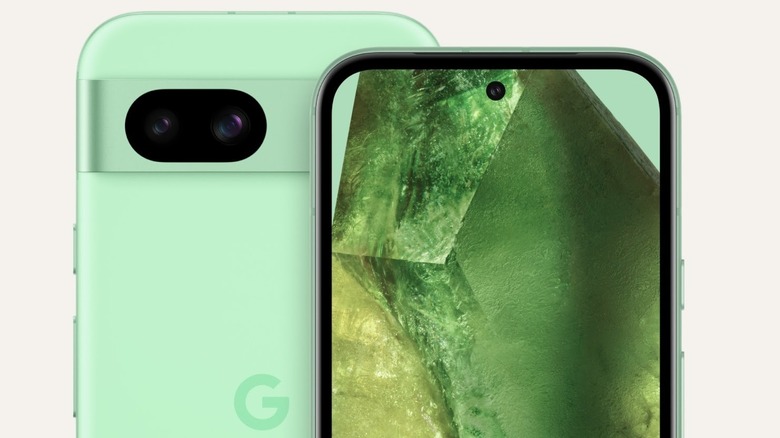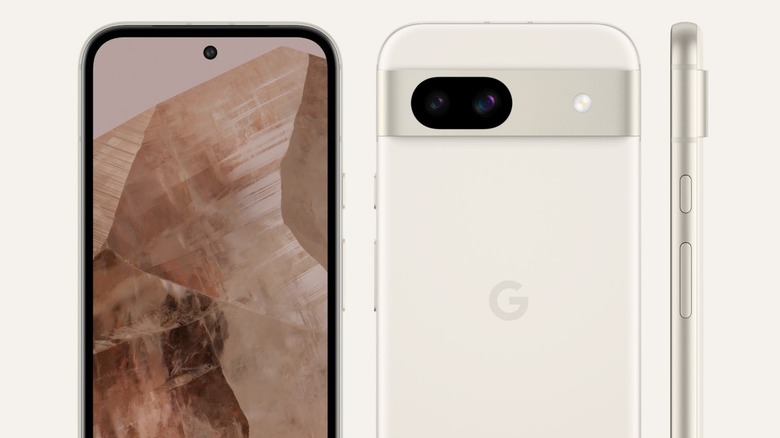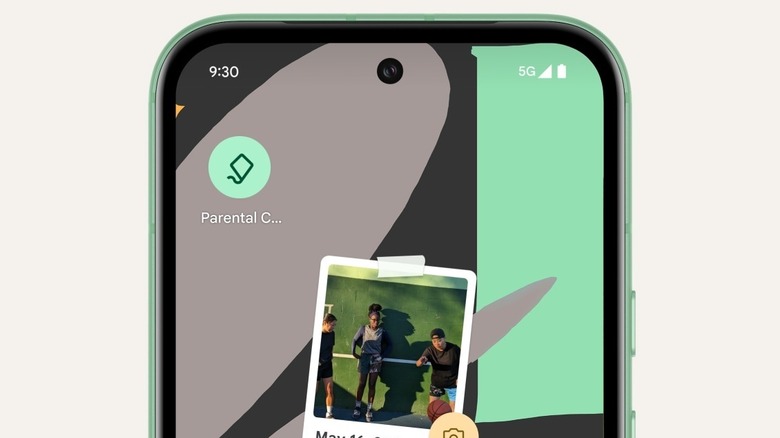The Pros And Cons Of Google's Pixel 8a
Google's Pixel phones have been among the most beloved Android devices on the market for quite a while, and for good reason. They're well known for their excellent cameras and unique designs. Moreover, they get their software updates straight from Google, delivering the newest versions of Android without delay. Most of the attention goes to the top-tier Pixel flagships, but the mid-range models have developed a reputation for being excellent devices in their own right at much lower prices. But how well do they hold up over time?
Enter the Pixel 8a, a budget friendly smartphone introduced partway through 2024. It garnered approval from reviewers at launch, but how does it hold up over a year later? After all, the Pixel 9 has been out for some time now, and the Pixel 10 is imminent. Mid-range smartphones often provide great value when they're new, but since they aren't launched with cutting-edge specs, they tend to show their age much more quickly. Although the Pixel 8a holds up remarkably well in 2025, with respectable hardware and software support, there are issues with its pricing relative to newer smartphones that make it difficult to recommend.
The Pixel 8a holds up well over a year after release
To Google's credit, the Pixel 8a is in no danger of feeling outdated for those who own it. With a 6.1-inch, 1080p display with a premium, 120 hertz refresh rate, a Google Tensor G3 processor, 8 gigabytes of RAM, and a 4,492 milliamp-hour battery, it's certainly not making as many compromises as some other devices at that price point. Throw in a 64 megapixel main camera (better in some regards than the mainline Pixel 8, which rocks a 50 megapixel sensor), a 13 megapixel ultrawide shooter, and Google's famously great image processing software, and you're not making the sort of sacrifices other mid-range devices make to their cameras. For its minimal sacrifices and relatively cheap price, SlashGear's Pixel 8a review handed the device a score of 8/10 and awarded it our SlashGear Select badge.
Then, of course, there's Android. Phones sold by the operating system's maker get a bespoke experience, not to mention plenty of support. The Pixel 8 range was the first set of devices for which Google promised to deliver seven years of software updates, and the 8a is no exception. Moreover, Pixel devices tend to receive the latest versions of Android before they arrive on phones from other brands. Look no further than Android 16, the latest major update, which arrived on Pixel devices back in June 2025. It has yet to make its way to any Samsung phones other than the newly launched Galaxy Z Fold 7 and Z Flip 7. Additionally, Google tends to make a lot of its best software features exclusive to Pixels for a time. But there's one major reason you still shouldn't get a Pixel 8a in 2025.
The Pixel 8a isn't worth the price in 2025
When it comes to the downsides of the Pixel 8a in 2025, its price makes it a non-starter. The Pixel 9a is already out, packed with a year's worth of upgrades including a newer processor, larger display, and bigger battery. But for some reason, both smartphones are priced identically, starting at $499 for the base 128 gigabyte model with 8 gigabytes of RAM. That means there's no conceivable reason to pick the 8a over the 9a unless it comes down drastically in price. It's not just Google, either. On Amazon, the Pixel 8a sits at $487 as of this writing, while the 9a is only $12 more expensive.
That year of spec bumps makes a difference. The Tensor G4 processor found in the Pixel 9a is a respectable improvement over the Tensor G3 in the 8a, feeling mostly the same with normal, everyday use but showing a decent bump in benchmark tests. The newer phone has a slightly downgraded 48 megapixel main camera, but megapixel counts aren't everything, and the 9a also eschews the 8a's prominent camera bump. Moreover, the 9a is guaranteed to get software updates for a year longer than its predecessor, making it more future-proof. Ultimately, if you own a Pixel 8a, you shouldn't feel pressure to upgrade quite yet. But if you're shopping for your next phone, and you want an affordable Pixel, the 9a is still the obvious choice until the 8a comes down in price.


